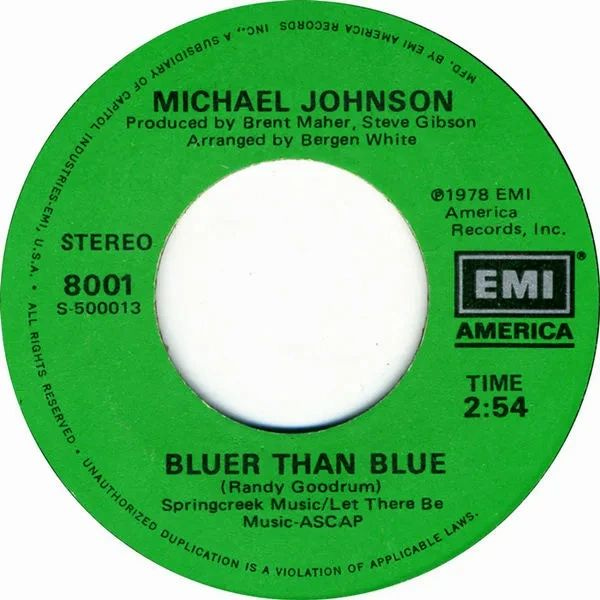Lost Classics: Michael Johnson - Bluer Than Blue
It was 1978 and I was 11 years old (but going on 12!). My biggest concerns in life were Ohio State football and my little league baseball team. Oh, and every weekend I made sure to listen to American Top 40 with Casey Kasem on the radio. I knew I'd hear some of my favorite songs and I'd likely find something new and exciting along the way. I mean, I was 11. I didn't exactly sit and listen to the radio all day, but I did more than my fair share of listening for someone that age.
One day, Casey was introducing a new song in the countdown by a guy named Michael Johnson. I had never heard of him. Who was this guy? What a plain-sounding name for someone on the radio! Something about such a normal name stuck out to me and made me pay closer attention (I'd typically read a book while listening, honing my multi-tasking skills early).
The piano intro caught my attention immediately. It was a simple riff that was almost like someone playing scales. Then Michael's voice comes in all soulful and plaintive. I remember thinking how sad the guy sounded and was kind of blown away by that emotion, although he was singing lyrics that seemed almost happy.
After you go, I can catch up on my readin'
After you go, I'll have a lot more time for sleepin'
And when you're gone looks like things
Are gonna be a lot easier
Life will be a breeze you know
I really should be glad
That vocal in that third line especially just grabbed me. It sounded so good but also like he was in so damn much pain. And then came the old switcheroo, switching the message from "man, I can't wait until you're out of here" to the beautiful yet painful truth.
But I'm bluer than blue
Sadder than sad
You're the only light
This empty room has ever had
Life without you is gonna be
Bluer than blue
I was floored by both the smoothness and the sadness in Johnson's vocal. The emotion in the chorus is aided by an understated harmony vocal and strings that intensify everything that's going on.
The second verse kicks in and the lyrics become sadly funny now that you know what he's going on about. The narrator is becoming petty and a little silly but it's all a false bravado. And you're in on it now, so it's even sadder when he switches back to talking about all the things he should be glad about.
After you go
I'll have a lot more room in my closet
After you go
I'll stay out all night long if I feel like it
And when you're gone
I can run through the house screamin'
And no one will ever hear me
I really should be glad
And it's So. Damn. Sad.
Johnson launches back into the chorus, but this time he sticks in a bridge at the end that overlaps as he holds the word "blue" at the end of the chorus.
I don't have to miss no TV shows
I can start my whole life over
Change the numbers on my telephone
But the nights will sure be colder
The chorus repeats and then slows to a crawl as he emphasizes the song's title lyrics to soft piano and strings. It's two minutes and 57 seconds of the sweetest pain — the kind Elton John talked about in "Sad Songs (Say So Much)" when he sang;
The kick inside is in the line that finally gets to you
And it feels so good to hurt so bad
And suffer just enough to sing the blues
At that age, I had had crushes on girls at school and infatuations with celebrities, like the women on Charlie's Angels, but I had no practical experience of being brokenhearted until I heard "Bluer than Blue." Later, when I experienced heartache myself, I always thought of this song. Sometimes I played it. There was some catharsis in it but also just the solace that the hurt of a breakup was a thing that other people go through too. I wasn't alone. As a result, "Bluer than Blue" still resonates with me to this day.
The song went to No. 12 on the Billboard Hot 100 and No. 10 on the Cash Box Hot 100, as well as all the way to the top spot in the Billboard Adult Contemporary chart in the U.S. It ranked only as the No. 81 song for 1978 in the year-end Hot 100, which seems a travesty to me, but that's kind of why it's a "lost" classic.
I never heard another song by Michael Johnson until I went looking for him one day on Spotify not long ago. His vocals are outstanding and really are the star of the song, along with the lyrics by songwriter Randy Goodrum.
The fact that I connected so deeply with this song at 11 years old makes it a bit ironic that Johnson once said of the song, "I knew it was potentially a successful song but I didn't think it would go this far. It seemed, well, too mature. The experience of being married or living with someone is hard to identify with for younger people."
I have to credit Johnson for the song's success because it's his voice that carries all of the feeling of the song to the listener. Even for me, who had never been through a breakup, it was something I felt because of how he sang it. And the juxtaposition of the list of things he could now do that ought to be making him happy when in truth he was miserable...it just worked for me.
For me, "Bluer than Blue"is a lost classic.




